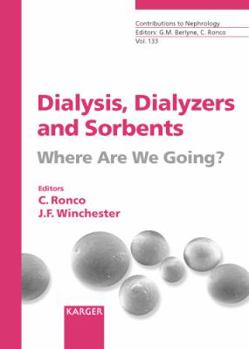Dialysis, Dialyzers and Sorbents: Where Are We Going?
Over the last decade, the availability of new devices and membranes has led to the development of modern hemodialysis techniques in which clinical tolerance and efficiency have significantly improved patient morbidity and mortality. Nevertheless, there are still limitations imposed by hemodialysis, manifested by the long-term complications occurring in patients treated for several years. Since most of these complications seem to be related to the chronic inflammation of ESRD patients and the progressive accumulation of middle-large molecules such as beta-2-microglobulin, GIP, leptin and others, a novel approach is needed, capable of adequately removing these substances from the body of the patient. New polymers with a biocompatible surface and high affinity for specific molecules have already been introduced to the market, and adsorption might in fact represent a new form of solute removal. Featuring articles by renowned experts, this volume provides the reader with a comprehensive summary of the most updated technology in the field of hemodialysis. New devices and techniques are described and discussed in detail, complemented by preliminary results; the rationale for adsorptive therapies completes the analysis. Residents and fellows, as well as staff physicians and members of the academic and scientific community involved in practice and research in the field of hemodialysis will find this book a valuable addition to their bookshelves.
Format:Hardcover
Language:English
ISBN:3805572255
ISBN13:9783805572255
Release Date:January 2001
Publisher:S. Karger AG (Switzerland)
Length:199 Pages
Customer Reviews
0 rating





